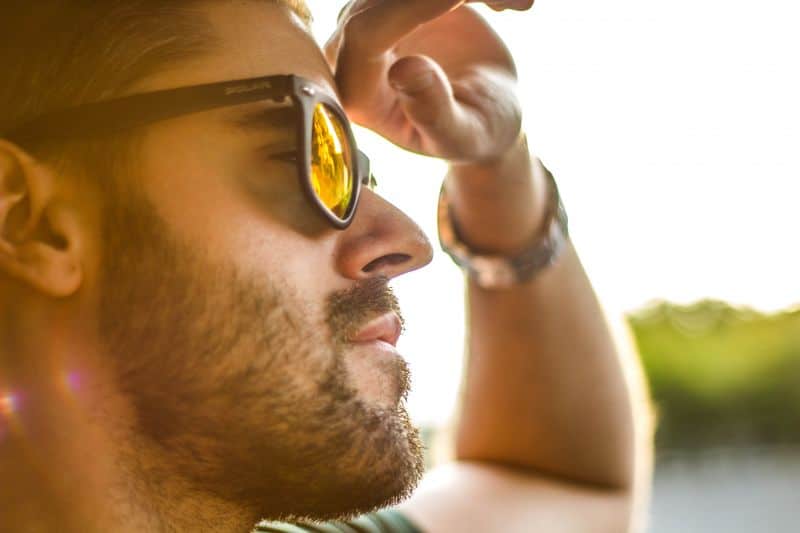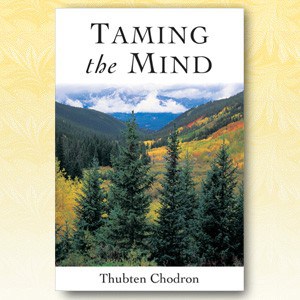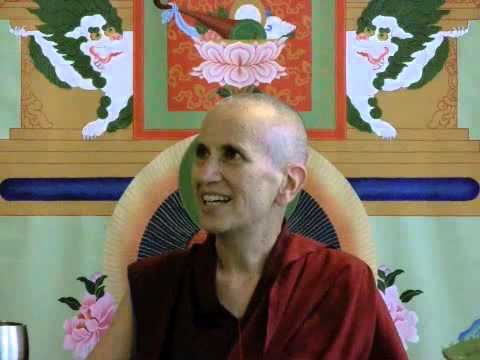Leading ourselves out of addiction
By M. P.

Venerable Thubten Chodron was asked to speak to both the counselors and the clients of a drug rehab center. In preparation, she asked one of the incarcerated men with whom she corresponds to describe his experience of getting clean.
Nobody really enjoys feeling dirty and ignorant. Once I realized I was the person in charge of this situation and these feelings, I committed to doing the work. We are the ultimate source of salvation and refuge: there is no omnipotent creator out there responsible for what we are and capable of making everything perfect again. We create the causes that produce the effects. How could I hope to see the cessation of suffering within my mindstream as long as I continued to create new causes for future suffering? If I claim to be nonviolent and compassionate, how can I keep using substances that harm myself?
We can use the blueprint of the three principal aspects of the path: renunciation of the three root addictions (sugar, caffeine, and nicotine) and the subsequent addictions (drugs, alcohol, etc.). We must make a commitment to turn away from the belief that these substances would provide lasting, real refuge from whatever appears unsatisfactory. We need to determine to rise above these negative behaviors and replace them with positive ones.
I’d read that habits carry over from one life to the next. Liberation was not going to happen if I continued to hold onto habits and addictions. How could I claim to be working towards enlightenment if I had nasty habits I wasn’t willing to renounce?
Wisdom and compassion are important. We have to be smart enough to see what hurts and compassionate enough to not do it.
By having compassion for ourselves, we quit hurting ourselves and determine to rise above the addictive destructive behavior not only for our own benefit, but also for the benefit of others. The suffering caused by addiction is always a shared experience, affecting family and friends, harming the very people we care the most about.
Of course we’ve affected the people we love with our addiction and negative actions. Suicide isn’t the answer, neither is carrying around a deflated sense of self, based on guilt produced by our actions. They happened. They weren’t a good thing. Now we’re in the present moment. Don’t do them now. Don’t do the things that hurt others.
With wisdom, we reason and investigate every aspect of our lives using a mind that is not impaired by intoxicants. Through this, we are able to abandon the false view that cessation of suffering comes through using addictive substances. We gain confidence in the path and our ability to apply the healing elixir that springs from our own heart. Through the experience of getting clean, we see for ourselves that we function better on every level. We don’t have to rely on faith to see this. We see for ourselves that our previous belief in external sources of pleasure and suffering was not accurate. We see that all we experience relies not only on previous causes, but is also shaped by the way we filter, condition and react to things as they occur.
One of my sources of strength was seeing that there was an aspect of myself that remained pure and unconditioned and that the potential of this immutable aspect allowed for Buddhahood. I saw my conventional mentality was being poisoned with substances that kept me from being able to realize my intrinsic Buddha nature. I could intellectually infer this but couldn’t abide with it, and felt that if I could purify my body and thoughts I could meditate on the Buddha nature. I vowed to myself and to my future Buddha that I’d quit using things that hurt me and had a negative effect on my body, which is the basis for Dharma practice.
Drug rehab
As someone referred by the court to a drug rehab center, I had no intention of stopping. I just wanted to play the game so I could go home. Everyone else committed by the court was just like me. We put our net out and kept each other from being busted. We hid dope for each other and walked someone around when he took too much. We learned how to talk in the counseling sessions so it would look like we were participating. The counselors thought we were really trying and they also thought they were doing a good job as drug therapists. None of us came out of that program clean though we all “graduated.”
Traditional drug rehab only works if the client-patients have already decided to heal themselves. Once a person makes that vow to himself or herself, the healing can happen anywhere, even in prison. The real prerequisite is the individual’s disgust with their addictive behavior. They have to be sick and tired of repeating the cycle of suffering perpetuated by their dissatisfaction with their life and compounded by their belief that the substances can make them feel better.
Addicts are fearful. They’re afraid to admit it of course. They are so afraid that they do dangerous things to themselves and others in an attempt to avoid all they fear.
Love for ourselves must get established on that narrow strip of beach-head perched between the ocean with its nectar and sharks behind and the steep cliff ahead which they must climb to reach a place of health and happiness. Hard work is always painful. It’s easier to just give up and slide back into the waters, tasting the nectar until the sharks come again and bring blood and pain. Climbing the cliff is hard. There’s little confidence that it will be any better up there anyway. This is where meeting a true path can prove effective. A rope that works in the beginning brings some immediate good effect that instills confidence and compassion for self. In the middle it shows a methodology that is consistent and believable to a battered cynic. A foothold is established if someone can be convinced to alter his or her diet and activities, exercise moderately, read, study, do yoga and meditation of a non-sectarian nature. They will get calmer and some fear will dissolve.
During my drug days, I would spend more time running around trying to find the substance of my choice and more money daily using it than I would ever have working a straight job. I was miserable because I didn’t have a good-paying job, but I spent money and time that could be used in getting one on drugs and alcohol. If I had used my time and money wisely, I wouldn’t have had to blame anyone else.
Most addicts want to get clean, but they lack confidence in the system, the clinic and the therapists. Now in prison, I counsel others. I talk as a recovering addict. My motivation is based on compassion and the wish to benefit (not some kind of agenda to get them to change). If they don’t see it and believe it, they’ll never come out to meet me in the middle. Sometimes people thank me for helping, but I remind them that they did the work. They cleaned up their lives on their own, without a clinic or a therapist. They were their own therapist. Clinics and drug rehab programs need to empower the individual.
Happiness: outside or inside?
An essential point is to see that outside people, objects and events do not make us happy or miserable. Our happiness or misery depends on how we interpret things. We have to stop blaming others for our unhappiness. Do we blame outside because we have no self-esteem? Do we really find ourselves worthless and incapable of helping ourselves? Or are we caught up in the myth that exterior things bring internal peace, happiness and meaning in our lives?
Nothing outside ever makes us completely happy. My life wasn’t what I wanted it to be. I felt unhappy with who I was because I felt incapable of correcting what was missing in my life. I was incapable because I kept looking for the big help to come from outside. The big miracle was going to be out there. In Buddhism I’ve learned that no lasting peace can be found in material things because they’re constantly changing. I’ve begun to look inside for the source of happiness.There’s no happiness to be found in the past or the future. Neither of them is happening right now. We exist solely in the present. Maybe it’s called the present because it’s a gift. It’s in the present moment that we receive the gifts of life, of loving kindness, of happiness. We all want happiness that is, not was, not will be. Those things do us no good now. Now is where we want to be happy.
The difficult situations are really excellent opportunities. When we are confronted with something that would have sent us running for the dope-house, the bottle, the needle, these are the times we test our progress and resolve. The same type of circumstances seem to happen throughout our lives. We can change the way we react to them. That’s how to change our life. We must be able to adapt to change, to react to whatever comes up not as though it were something we had no choice in, but as some things that we do have a choice in. We choose how we react, we choose how to look at the situation.
I can be in a cold concrete cell in prison and complain and be miserable, or I can see it as an excellent opportunity to meditate and practice patience. There is plenty to do in this cell. This “I” is where all the work of a lifetime must be done. I have the tools, the place, the worker—they are all inside me—what else could I request? I have a relationship with a compassionate teacher; I have access to Dharma books enabling me to learn the path. I have everything necessary to do the work that needs to be done inside. I can’t curse the people who imprisoned me. They are giving me the opportunity to meditate in a private space where I can do the most important work of my life. Instead of blaming them, I turn my focus inward towards the real source of unhappiness in my life and take this opportunity to get some work done. There is always work to do on ourselves. We can never be bored.
We have to accept our own share of responsibility for what comes to us in this life. It’s scary at first. If we relate fear to an exterior source, we feel incapable of dealing with it other than through escape. See fear as self-generated. Throw it outside with the other useless things. We have to throw all the stuff we don’t like about ourselves out. This is the process of getting clean and empowering ourselves. I was never really not empowered, I just believed I was. It was easier to blame something outside so that I could be excused from doing my share of the work.
The healing all gets done in our minds and hearts, here in our mind where the therapists can’t see and where we hide things from them and mock them for believing that we haven’t used in three weeks. If we can look into our minds this far, then we can start to move the mental furniture around. We may need help at first, like sometimes we need a professional mover. But we can get the hang of it ourselves. We know we can penetrate deeper into these rooms than anyone out there can. We can keep things in our mind and keep things out. So let’s keep happiness in and throw blaming others out. Just as we kept our drug addiction a secret by keeping it locked inside, let’s lock our healing inside and send the addiction outside with all the other stuff we have no use for.
One doesn’t need to be Buddhist to successfully stop using drugs. In my case, it made me additionally determined to eradicate addictive behavior.
Teachers and friends
An honest relationship between a qualified teacher and the disciple can never be emphasized enough. I was looking ahead to a time when I would meet a guru and engage in the transformative process. I knew at some point in my life I would need to make commitments to mind training and knew this involved purifying my actions and letting go of attachments (addictions). I knew I needed to do some work prior to making a commitment to a guru. There would be delicate moments when defilements and old temptations would arise in the future and I was determined to have a head start on acting ethically when it mattered.
Friends are also important. When we use drugs and alcohol, we surround ourselves with others who also use. When we try to clean up, it’s nearly impossible if we continue to hang out with the same people. They continue to use and have all the rationale that we had for using and none of the rationale for stopping. Caring, good friends support each other. If I have a weak moment and want to backslide and am with addictive “friends,” I will fall. If I’m around ethical, clean friends, I’ll be able to rely on their safety net. They’ll be able to rely on mine as well. I think support groups work better when the participants are working on removing all their addictions, instead of leaving the “root” substances unaffected.
Incarcerated people
Many incarcerated people from all over the United States correspond with Venerable Thubten Chodron and monastics from Sravasti Abbey. They offer great insights into how they are applying the Dharma and striving to be of benefit to themselves and others in even the most difficult of situations.


